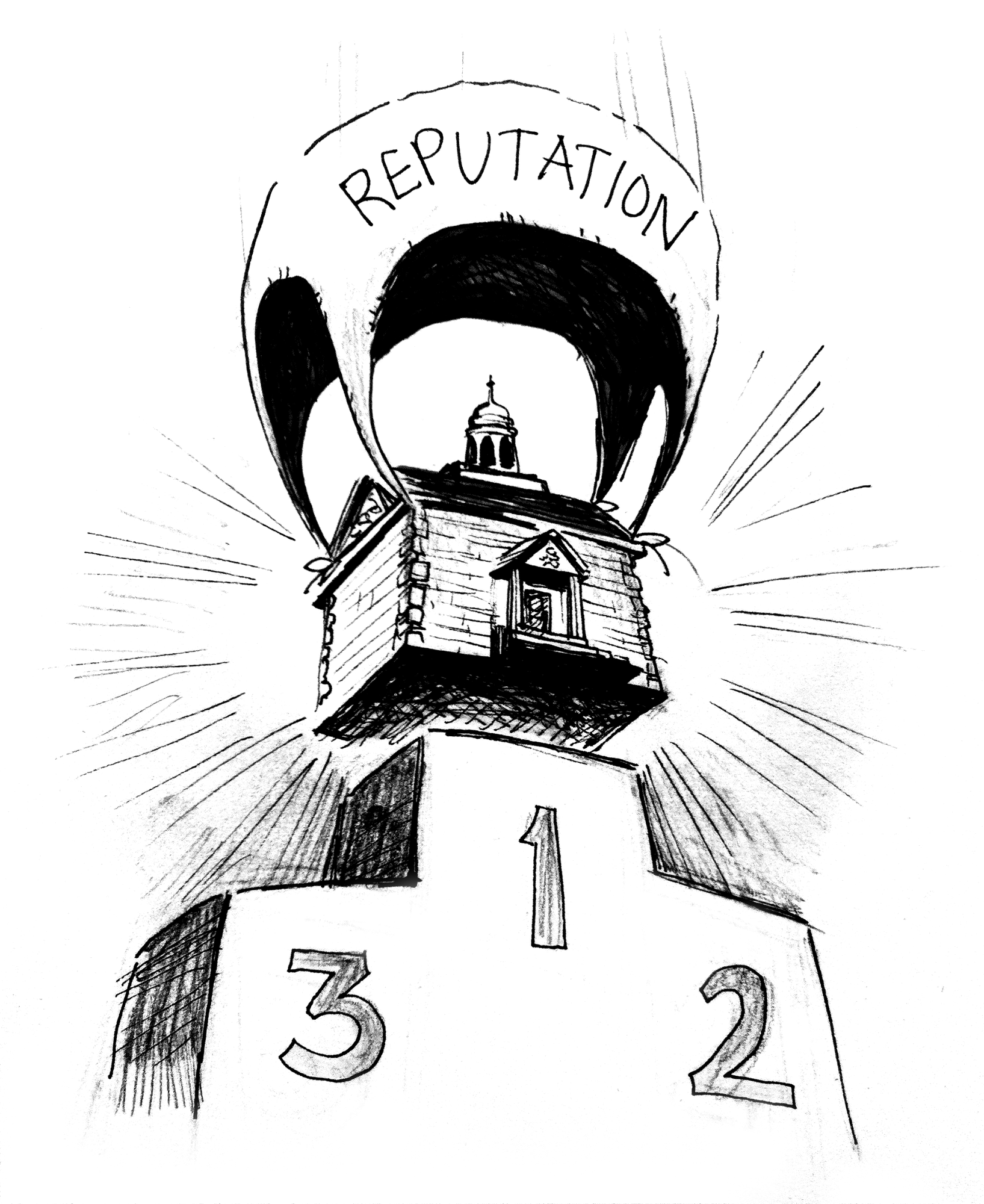
News
HMS Is Facing a Deficit. Under Trump, Some Fear It May Get Worse.

News
Cambridge Police Respond to Three Armed Robberies Over Holiday Weekend

News
What’s Next for Harvard’s Legacy of Slavery Initiative?

News
MassDOT Adds Unpopular Train Layover to Allston I-90 Project in Sudden Reversal

News
Denied Winter Campus Housing, International Students Scramble to Find Alternative Options
Rank and Defile
How national college rankings represent a social network of top schools

“Is burritos”—Dashiell Young-Saver. Nov. 1, 2008
“Is a churro” —Dashiell Young-Saver. Nov. 2, 2008
“Is a matzo ball”—Dashiell Young-Saver. Nov 22, 2008
“Is a pizza pie and that’s amore”—Dashiell Young-Saver. Dec 4, 2008
Normally, it may be considered vain or (more likely) redundant to quote oneself. But, as I scrolled through my Facebook timeline back to freshman year of high school, I realized that I can’t remember what the hell was going through my head at that time. To me, it’s become unrecognizable.
I don’t know why I wanted to share those statuses. Beyond representing a certain multicultural awareness, they just show a drastically misplaced importance for the idiom “you are what you eat.” Plus, I stumbled upon a Facebook note that year entitled “people who are dooshes,” in which I cleverly call people who use laptops at Starbucks and people who Google their names often “dooshes.” To say the least, reading these now is strange. And it makes me feel a bit dooshy.
But I’ve realized that going through them is not so much strange as it is stranger. I can’t recognize the version of me that wrote these. So when reading through my virtual social life, there is a feeling of remoteness—I recognize that I must have changed a lot since then, but I also know that I cannot fully access what was going through my head by reading these old statements of what was “on (my) mind.”
It is rare, but just last month I had that same remote feeling while doing something completely different—reading U.S. News and World Report’s 2014 summary of Harvard College. For the first time since 2008, the magazine ranked Harvard second. I wanted to see why we moved down. So I looked at the report and had that same strange freshman Facebook feeling.
Here’s one sentence from it that may show why: “Although they are no longer recognized by the university as official student groups, the eight all-male ‘final clubs’ serve as social organizations for some undergraduate students; Harvard also has five female clubs.” This was the only sentence about Harvard’s social life, and it’s the type of insight you’d expect from an economist who watched the “The Social Network” once, while playing a drinking game. There is a certain objective accuracy yet total remoteness to it, and that remoteness draws out the subtleties of “objectively” ranking colleges, which make those rankings both extremely important and extremely pointless for top schools.
College rankings traditionally operate the same way that Facebook and “The Social Network” do—making profit through social perception and reputation. Colleges known as the “top schools” get better applicants, which makes them into more selective, better schools. The job market responds accordingly. Alumni money filters back. And the top schools then repeat the cycle, starting from the top. Thus, the reason top schools are top schools is because they are top schools.
When U.S. News and World Report began ranking schools in 1983, the only criteria on which colleges were judged was reputation: what other colleges thought of one another. It was only in recent decades that the magazine tried to make it more “objective,” using other criteria for their rankings such as retention rates (weighted as 22.5 percent), faculty resources (20 percent), student selectivity (12.5 percent), financial resources (10 percent), graduation rate (7.5 percent) and alumni giving rate (5 percent).
At the end of the day though, the rankings really amount to a pseudo-objective reflection of subjective reputation. “Reputation” is still given a large weight in the rankings (22.5 percent). Furthermore, a 2009 study proved that the rankings themselves actually affect schools’ perception of one another. Thus, the rankings affect their own criteria by increasing the reputation scores for schools they already rated highly. This pattern also affects student selectivity and alumni giving rates—higher-level students apply to schools based on U.S. News rankings, and employers give high salaries to alumni from these schools. If that weren’t enough, the already affected alumni giving rate then affects another category: financial resources.
So, the rankings too get caught in a cycle of making “objectively better” schools even more objectively better, and nothing seems to change. In fact, one 2001 paper claimed that only 10 percent of changes in U.S. News and World rankings are due to changes in the quality of the schools; the rest are because of shifts in ranking criteria.
Although Harvard lost its top spot, it really doesn’t have to worry—it’s subjectively, objectively a top school. And because of that, it will stay that way on any mainstream scale. But what will be lost is any insightful description of the qualitative experience that being a student for four years provides, which no reputation in a social network of schools can reflect.
Just as there is more to say about Harvard’s social life than the quantity of its final clubs and there was more to me in 2008 than being a churro, there is much more to say about Harvard’s education than what other people think of it. Most applicants and employers probably already know that. Based on the numbers though, I’m not sure that they know exactly how much more there really is.
But to help out just a bit, I’ll tell you my feeling towards my year or so of education here:
That’s amore.
Dashiell F. Young-Saver ’16, a Crimson editorial writer, is an English concentrator in Winthrop House. His column appears on alternate Wednesdays.
Want to keep up with breaking news? Subscribe to our email newsletter.
